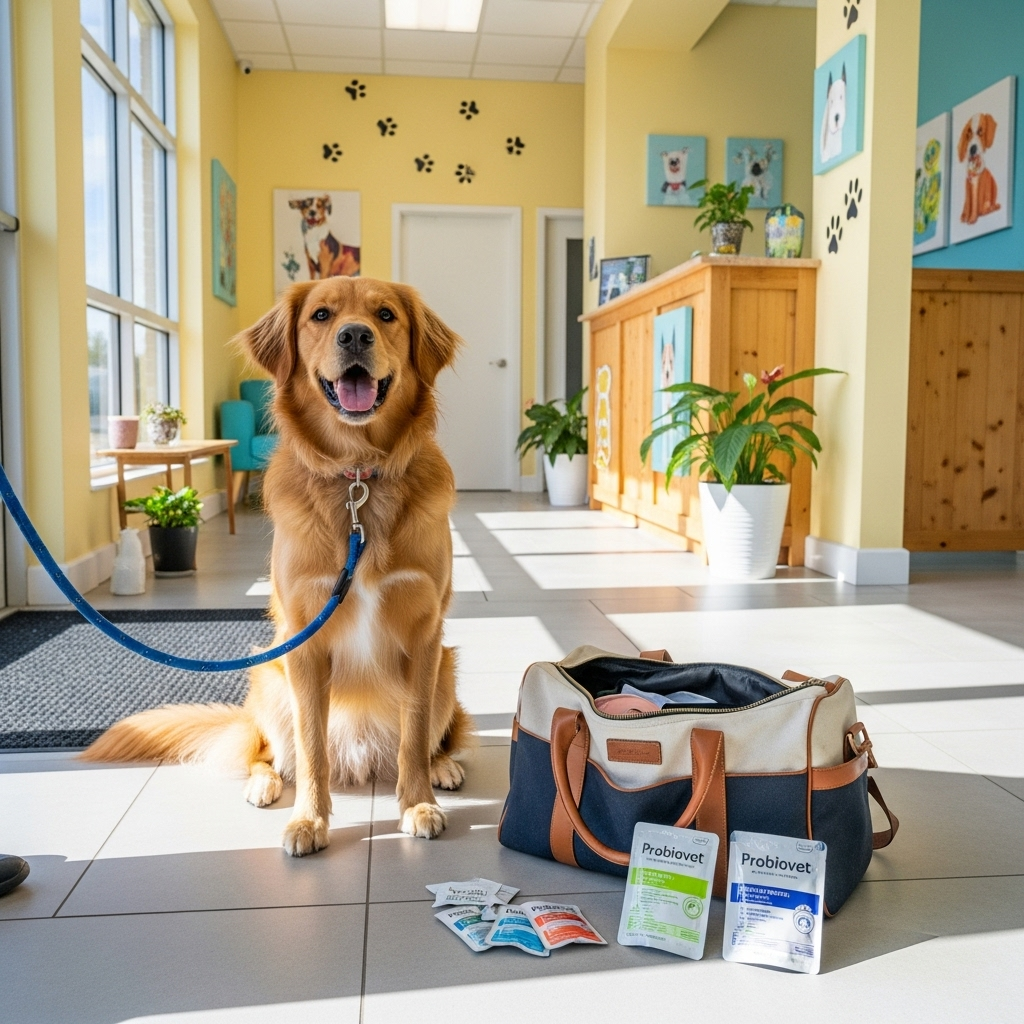Boarding Stress Diarrhea: Probiotics for Dogs

Leaving a dog at a kennel or boarding facility can be stressful for both pet and owner. One common issue at boarding is stress-related loose stool or diarrhea. This guide explains how probiotics for dogs can help with boarding stress diarrhea prevention, what to look for in products, how to use them safely, and other practical steps to reduce the chance your dog will have digestive upset while away from home.
Why dogs get diarrhea at boarding
Boarding often changes a dog’s routine: new smells, different feeding times, unfamiliar dogs and people, and altered exercise. These changes trigger stress responses that can alter gut motility, gut bacteria balance, and immune function — any of which can lead to softer stools or diarrhea. Exposure to different diets or accidental ingestion can also cause gastrointestinal upset.
How probiotics can help
Probiotics are live beneficial microorganisms that may help stabilize the gut microbiome, support digestion, and reduce the duration or frequency of acute diarrhea in some dogs. For boarding stress diarrhea prevention, probiotics aim to:
- Support a healthy balance of gut bacteria during stressful events.
- Help maintain normal stool consistency.
- Reduce the risk of opportunistic bacteria proliferating during stress.
What the evidence says
Clinical studies in dogs show that certain probiotic strains can decrease the incidence and length of acute diarrhea episodes and may help dogs adapt to kennel environments better. However, effects vary by strain, dose, and the individual dog. No probiotic guarantees prevention of diarrhea in every dog.
Which probiotic strains to consider
Not all probiotics are the same. Common strains and types used safely in dogs include:
- Enterococcus faecium — frequently used in canine products and studied for reducing diarrhea.
- Lactobacillus species — common gut bacteria that may support digestion.
- Bifidobacterium species — associated with gut health and immune support.
- Saccharomyces boulardii — a beneficial yeast shown to be effective for certain types of acute and antibiotic-associated diarrhea.
- Bacillus (spore-formers) — shelf-stable strains that survive storage and stomach acid well.
Look for products that list strain designations and CFU (colony-forming units) at the time of manufacture or guaranteed through shelf life. Choose formulations made specifically for dogs.
How to use probiotics for boarding
- Start early: Begin the probiotic 5–7 days before boarding to allow gut flora to adjust, continue during boarding, and for 3–7 days after returning home.
- Follow dosing directions: Use the manufacturer’s or your veterinarian’s recommended dose based on your dog’s weight. Don’t exceed label instructions without veterinary guidance.
- Choose a form your dog will eat: Options include powders that mix with food, soft chews, capsules, or kibble toppers.
- Maintain routine: Keep your dog’s feeding schedule and favorite toy or blanket in the kennel when allowed — behavioral measures reduce stress and complement probiotic use.
- Keep records: Note which product, strain, dose, and start date — useful information for your vet if issues arise.
Safety considerations
Probiotics are generally safe for healthy dogs, but you should:
- Consult your veterinarian before starting probiotics, especially if your dog is elderly, ill, pregnant, has a compromised immune system, or is on immunosuppressive drugs.
- Avoid unverified human products labeled for pets without veterinary approval. Use products made for animals when possible.
- If your dog develops worsening diarrhea, vomiting, blood in stool, lethargy, or fever, stop the probiotic and contact your veterinarian promptly. These signs require medical evaluation.
Complementary steps to reduce boarding stress
Probiotics work best as part of a broader plan:
- Exercise your dog before drop-off to lower anxiety.
- Bring familiar items: bedding, toys, and an unwashed shirt with your scent (if allowed).
- Use calming tools if appropriate: pheromone diffusers, anxiety wraps, or prescribed anti-anxiety medication when advised by your vet.
- Choose a reputable boarding facility with good hygiene, consistent routines, and staff who know your dog’s needs.
Pros and Cons
| Pros | Cons |
|---|---|
| May reduce incidence or duration of stress-related diarrhea | Effectiveness varies by strain and individual dog |
| Generally safe for healthy dogs when used properly | Not a substitute for veterinary care if serious illness occurs |
| Available in convenient forms (powder, chew, capsule) | Some products lack clear strain or potency labeling |
FAQ
Q: When should I start probiotics before boarding?
A: Start 5–7 days before boarding to allow the probiotic to take effect, continue during the stay, and maintain for several days after returning home. Always follow your vet’s guidance.
Q: Can probiotics prevent all diarrhea at the kennel?
A: No. Probiotics can reduce risk and severity for many dogs, but they don’t guarantee prevention. Combine probiotics with good boarding choices and stress-reduction strategies.
Q: Are over-the-counter human probiotics OK for my dog?
A: Some human probiotics are safe, but products formulated for dogs are preferable because they use appropriate strains and doses. Ask your veterinarian before using human products.
Q: What if my dog is already on antibiotics?
A: Probiotics can help reduce antibiotic-associated diarrhea. Saccharomyces boulardii and certain bacterial probiotics are commonly used, but coordinate timing and choice with your vet.
Key Takeaways
- Boarding-related stress commonly causes digestive upset; probiotics can help lower the risk or severity of diarrhea for many dogs.
- Choose dog-specific products with identified strains and follow dosing instructions; start several days before boarding.
- Probiotics are part of a larger stress-management plan — combine with familiar items, exercise, and a reputable boarding facility.
- Consult your veterinarian before starting probiotics, especially for dogs with health issues or those on medications.
- Seek immediate veterinary care for severe symptoms like bloody stool, persistent vomiting, dehydration, or lethargy.
Final notes and disclaimer
This information is intended to be practical and informative for pet owners considering probiotics for dogs boarding stress diarrhea prevention. It does not replace personalized veterinary advice. Always consult your veterinarian to choose the right product and dosing for your dog’s specific health needs and medical history.
Disclaimer: This page provides general information about pet health and is not a substitute for professional veterinary diagnosis or treatment. If your pet has an urgent or life-threatening condition, contact your veterinarian or emergency clinic immediately.

Leave a Reply